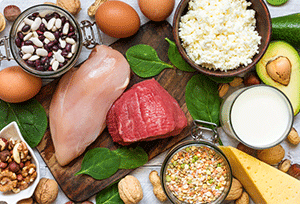Numerous simple and efficient methods exist to boost metabolism, many requiring minor dietary and lifestyle adjustments.
Your metabolism is in charge of turning the nutrients in your food into energy. It gives your body the energy it needs for breathing, movement, food digestion, blood circulation, and tissue and cell repair. However, your basal metabolic rate—the quantity of calories you burn while at rest—is also known as "metabolism." You burn more calories at rest if your metabolic rate is higher. Your age, food, body composition, sex, body size, level of physical activity, health, and any medications you take are just a few of the many variables that might impact your metabolism.
Other Topics You Might Like
Helpful Products You Might Like

Physician's Choice Probiotics For Digestive & Gut Health Supports
Amazon Basics Vitamin Gummies For Metabolism & Immune System Support
TRIO NUTRITION Apple Cider Vinegar Capsules with Green Tea
"(Paid Links)" 
Eat at regular times
The Nutrition and Dieticians recommend eating frequent meals and snacks throughout the day to avoid sharp fluctuations in hunger and fullness. Additionally, the organization suggests that people exercise caution when it comes to late-night munching.

Eat enough calories
Eating too little calories might cause the body to slow down its metabolism in order to save energy.
Considering the most recent dietary recommendations from a reliable source, women between the ages of 19 and 30 require 1,600–2,400 calories daily, depending on how active they are. The daily calorie requirements for males in the same age group are 2,000–3,000.
Depending on the trimester or age of the nursing infant, women may require an extra 452 calories during pregnancy and lactation.
Eat plenty of protein at every meal

A person's metabolic rate can be raised by changing the source of their calorie intake, but cutting calories does not raise it.For instance, protein might encourage thermogenesis—the body's burning of calories—more so than fat or carbs.
Drink green tea
Green tea contains caffeine and the antioxidant catechin. According to earlier studies, both of these substances may increase metabolism.
Although any gain is probably minimal, green tea may have additional benefits for weight management and overall health.
For instance, cutting back on sugar intake can be achieved by drinking green tea rather than sugary juices and sodas.
Consuming green tea throughout the day can help you stay hydrated. Green tea's antioxidants may help lower the risk of heart disease, blood pressure, cholesterol, inflammation, and cell damage.
cell damage, inflammation, blood pressure, and cholesterol.
According to the research, up to eight cups of green tea per day are safe.
People should consult a physician before increasing their use of green tea or drinking it while pregnant. Certain drugs may interact with it. Low folic acid levels during pregnancy may raise the risk of fetal development issues.
Lift weights
Lifting weights and engaging in activities that use resistance bands or the body's weight can facilitate building muscle.
Strength training may raise a person's resting metabolic rate, such as when they sit or sleep.
Consuming adequate calories, particularly protein, can help build muscle.
When resistance exercise and nutritional changes were combined, the metabolic rate increased slightly, but this difference was not statistically significant.

Make sure to stay hydrated.
Maintaining proper hydration is important for optimal bodily performance. Water may aid in weight loss and is essential for a healthy metabolism.
Drinking water may impact metabolism after finding evidence of increased fat oxidation after 500 mL while a person is at rest. They did not discover that it raised metabolic rate, though.
Reduce stress
It's unknown how stress and metabolic rate are related. Ongoing stress appears to increase appetite, food consumption, or weight. The researchers conclude that additional study is requito understand the impact of stress on metabolism fullylism. Stress may have an indirect impact by changing sleep and food habits, which can both change metabolism.
